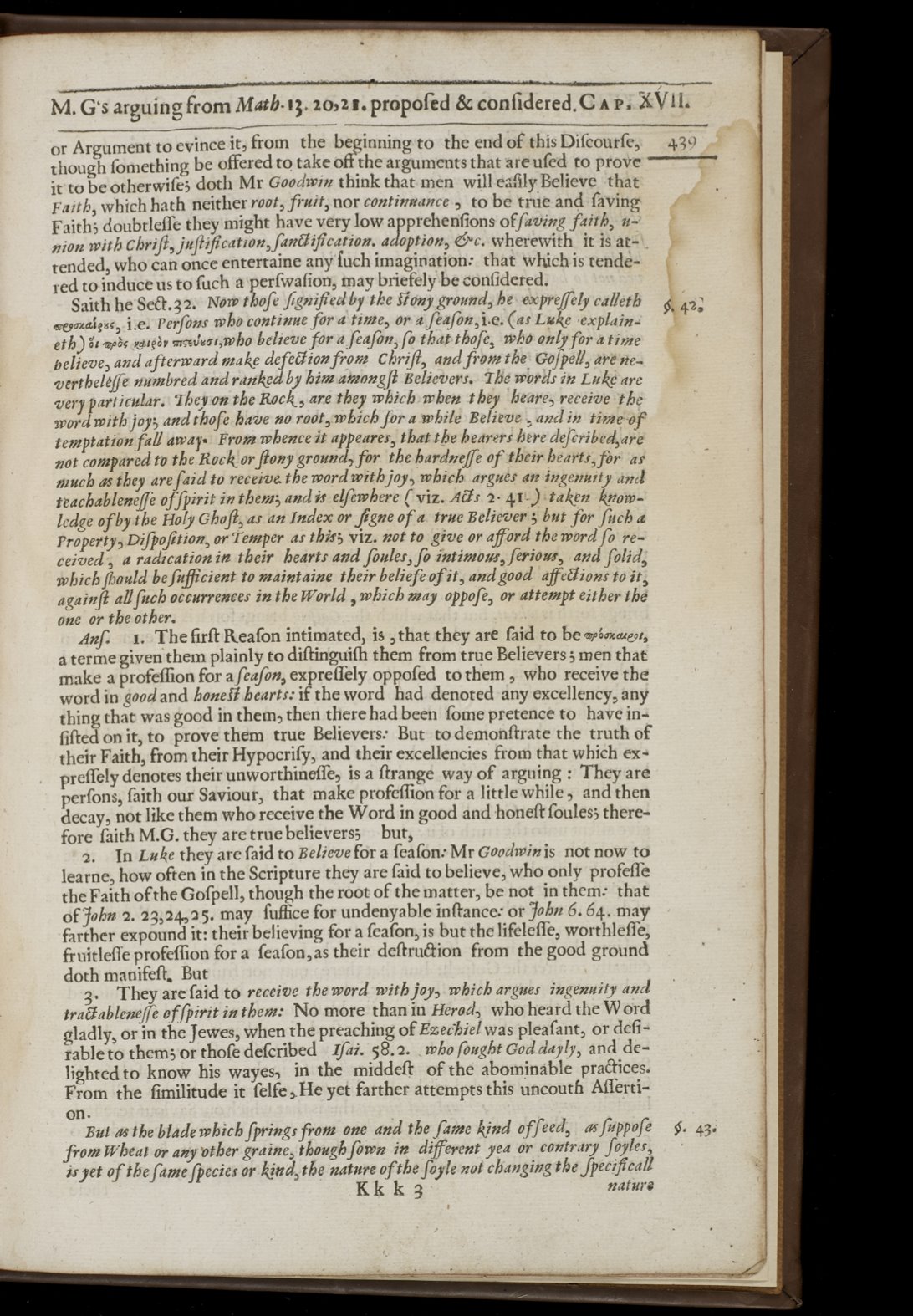

M. G's
arguing from
Matb I;.
20,2
t.
propofed
Sc
confidered.0
A
P. XVII.
or Argument
to
evince
it,
from
the beginning
to
the
end
of
this
Difcourfe, 439
though
fomething be offered
to take off
the arguments that are
ufed
to
prove
it-
to
be otherwife;
doth
Mr
Goodwin
think
that
men will
eafily Believe
that
Faith, which
bath
neither
root,
fruit,
nor
continuance
,
to
be
true
and laving
Faith; doubtleffe they might havevery low apprehenfions offaving
faith,
u-
nion with
chrifl, juflification,
fanClification. adoption,
&c.
wherewith it
is
at-
tended, who
can
once
entertaine any
inch
imagination:
that
which
is
tende-
red to induce
us
to
fuch
a
perfwafion, maybriefely
be
confidered.
Saith he
Se&.32.
Now
thofe fignifzed
by
the
11ony
ground,
he
expreffely
calleth
Q,
42,
.IDe,oz
dt
i.e.
Perforas
who
continue
for
a
time, or a
feafon,i.e.
(as
Luke
'
explain-
eth)as vas
,Pea
v.nçui
s,mho
believe
for
a
feafon,
fo that
thofe,
who only
fora
time
believe,
and
afterward
make
defeûion
from
Chrift,
and
from
the
Gofpell,
are ne-
vertbeleffe numbred
and ranked
by
him
among
fl
Believers. The words
in
Luke are
very
particular.
Their
on the
Rack,
are
they which when
t
hey
heare,
receive
the
word
withjoy;
and
thofe have
no
root, which
fora
while
Believe, and
in
time-of
temptation
fall
away. From whence
it
appeares,
that
the hearers here defcribed,are
not
compared
to
the
Rock
or
fiony ground,
for
the
hardneffe
of
their
hearts,
for
or
much
as they
are
faid
to
receive.
the word
with
joy,
which
argues
an
ingenuity
and
teachableneffe
offpirit in
them; and
is elfewhere
(
viz. Ads
2.
41.).
taken
know-
ledge
o
f
bythe
Holy
Ghofl,
as
an Index
or
fgne
of
a
true
Believer ; but
for
fuch
a
Property,
Difpofition,
orTemper
as
this; viz.
not
to
give
or
afford the word
fo re-
ceived ,
a radication in
their
hearts and fouler,
fo
intimons,
feriour, and
folid,
whichfhould
be
fuf
cient
to
maintaine their
beliefe
ofit,
and
good affellions to
it,
againfl allfuch
occurrences
in
the
World
,
which
may
oppofe,
or
attempteither the
one
or the other.
Anf, r.
The
firlt Keaton intimated,
is ,
that
they
are
faid
to
beomuerc,
a terme giventhem plainly
to
diftinguiffi
them from
true
Believers; men
that
make
a
profeffion
for
a
feafon, expreffely
oppofed
to
them ,
who receive
the
word
in
good
and
honell hearts:
if the
word had denoted
any excellency,
any
thing
that
was
good
in
them, then there had
been
Tome
pretence
to
have
in-
lifted on
it,
to
prove them
true
Believers: But
to demonftrate the
truth of
their
Faith, from their Hypocrify, and
their
excellencies from
that
which
ex-
preffely denotes
their unworthineffe,
is
a
ftrange
way
of
arguing
:
They are
perfons, faith
our
Saviour,
that
make
profeffion
for
a
little while,
and
then
decay,
not
like
them who
receive
the Word
in
good andhoneft foules;
there-
fore
faith M.G.
they are
true
believers;
but,
2.
In
Luke
they are
faid
to
Believe
for
a
feafon:
Mr
Goodwin
is
not
now
to
learne, howoften
in
the
Scripture they are
faid
to believe,who only
profeffe
the Faith
ofthe
Gofpell, though the
root
of
thematter,
be not
in
them:
that
of
John
2.
23,24,25. may
fuffice
for undenyable
inftance:
or
John
6.64.
may
farther
expound it:
their
believing
for
a feafon,
is
but
the
lifeleffe,
worthieffe,
fruitlefl'e profeffion
for
a feafon,
as
their
deftruétion from
the good ground
doth
manifeft, But
3.
They
are
faid
to
receive the word
with
joy,
which
argues
ingenuity
and
tra¿1ableneffe
offpirit
in them:
No
more
than
in Herod,
who heard the
Word
gladly, or
in
the Jewes,
when
the
preaching
of
Ezechielwas
pleafant, or defi-
table to them;
or
thofe defcribed Ifai. 58.2.
,
who
fought God dayly,
and
de-
lighted
to
know
his wayes, in
the middeft
of
the
abominable
practices.
From
the
fimilitude
it felfe,He
yet
farther attempts
this
uncouth
Afferti-
on.
But
as
the
blade which
fprings
from
one
and
the
fame kind
o
ffeed,
as
fuppofe
§.
43.
from
Wheat or
any
ether graine,
though
fawn in
different yea or contrary foyles,
isyet
of
the
fame
fpecies or
kind,
the nature
ofthe
foyle not changing
the fpeci
foal/
c l
K
k
k
3
nature










